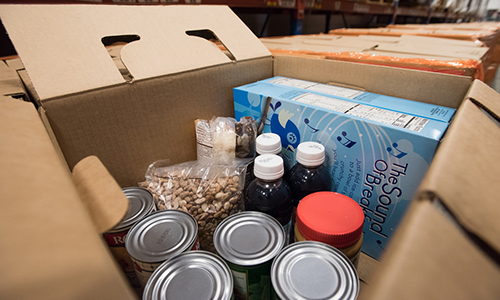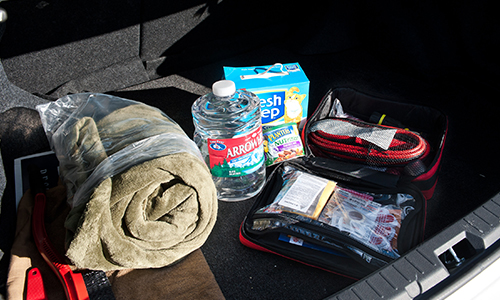A Set of Essentials for the Emergency Kit
Author

A keen runner, skier and nuts about cycling. Karl lives in Cumbria, where he loves encouraging his two children to follow in his outdoor lifestyle. Whilst out and about keeping active, Karl keeps a diary and shares it with Outdoor Look.
 Life is uncertain. While laying out a contingency plan, whether it is to counter a flood, an earthquake, a cyclone, or any man-made disaster, you need to be prepared for the worst. The most important aspect of an emergency plan would be to ascertain the possible channels of communication once the calamity strikes.
Life is uncertain. While laying out a contingency plan, whether it is to counter a flood, an earthquake, a cyclone, or any man-made disaster, you need to be prepared for the worst. The most important aspect of an emergency plan would be to ascertain the possible channels of communication once the calamity strikes.
Here’s a list of essentials that would be a valuable addition to your emergency safety kit.
- Ready-To-Eat Food
Dry food items can prove to be handy in case of an emergency. Having a few ready-to-eat food items at your disposal means you would have something to eat in case the food supplies die down due to unforeseen circumstances. Canned foods are your best bet as these do not require refrigeration. If you can manage to carry fuel and stove as part of your emergency kit, frozen foods are also a great alternative.
- Water Jugs
It is advisable to keep a gallon of water per person at hand for a duration of three days. If you have a water jug at your disposal, fill it and keep it ready for use. Also, having chlorine tablets at hand would also help. These tablets would help you purify water on-the-go.
- A Lantern or a Headlamp
Having a lantern close at hand would help you find your way in case you get stuck in the middle of nowhere during the wee hours of the night. An emergency headlamp or a torch with batteries would save you from stumbling in darkness. Keeping an extra set of batteries is also recommended.
- Keep a First-Aid Kit
An extra bit of emphasis needs to be put on this. In case you’re stranded somewhere and need to tend to your injuries, you need a first-aid-kit for that. Assemble a kit on your own or buy one from a medical store. In case a calamity shows its ugly head, make sure you have ample medical supplies to tend to your wounds.
- Maps and Compasses
Natural calamities are likely to disrupt the usual routes of travelling to and from a place. In such a situation, you’d have to find alternative routes to reach your destination. Google Maps and GPS are undoubtedly useful, but it is advisable not to rely heavily on gadgets running on batteries. A physical map and a compass would help you find your way through unknown lands.
- A Blanket and a Sleeping Bag
A sleeping bag and a warm and cosy blanket would be your ideal companions if you find yourself camping out in the cold. Make it a point to take an emergency blanket along. It won’t occupy much space.
- A Multi-Tool Would be Useful
Carrying a multi-tool that includes essentials such as a knife, screwdriver, scissors, etc. would come in handy while ripping apart fishing nets and ropes. Possessing a multi-tool might well be a blessing in disguise while you’re stuck in troubled waters.
- A Radio
In case there’s no power, a radio would help you keep track of weather updates and get real-time updates about the disaster. You can also enjoy a few songs just for the sake of passing time.
- A Simple Daypack Would Help
 Lastly, it is recommended that you store all your essentials at a designated place. It’d help you stay organised. Keeping all your stuff in a daypack means it’d be ready for use in case a calamity strikes.
Lastly, it is recommended that you store all your essentials at a designated place. It’d help you stay organised. Keeping all your stuff in a daypack means it’d be ready for use in case a calamity strikes.
Author

A keen runner, skier and nuts about cycling. Karl lives in Cumbria, where he loves encouraging his two children to follow in his outdoor lifestyle. Whilst out and about keeping active, Karl keeps a diary and shares it with Outdoor Look.
Categories
- Sport (28)
- Product Reviews (3)
- Team Outdoor Look (7)
- Mike Wild (2)
- Mike Payton (2)
- Suse Hammond-Pears (3)
- Snowboarding (12)
- Latest Offers (105)
- Shop Talk (1)
- Competitions (7)
- Walking (413)
- Lifestyle Fashion (8)
- Travel (86)
- Kit Guides (176)
- Workwear Clothing (6)
- Safety Workwear (4)
- Health/Fitness (289)
- Skiing (91)
- Great Outdoors (1316)
- Cycling (92)
- January 2025
- December 2024
- November 2024
- October 2024
- September 2024
- August 2024
- July 2024
- June 2024
- May 2024
- April 2024
- March 2024
- February 2024
- January 2024
- December 2023
- November 2023
- October 2023
- September 2023
- August 2023
- July 2023
- June 2023
- May 2023
- April 2023
- March 2023
- February 2023
- January 2023
- December 2022
- November 2022
- October 2022
- September 2022
- August 2022
- July 2022
- June 2022
- May 2022
- April 2022
- March 2022
- February 2022
- January 2022
- December 2021
- November 2021
- October 2021
- September 2021
- August 2021
- July 2021
- June 2021
- May 2021
- April 2021
- March 2021
- February 2021
- January 2021
- December 2020
- November 2020
- October 2020
- September 2020
- August 2020
- July 2020
- June 2020
- May 2020
- April 2020
- March 2020
- February 2020
- January 2020
- December 2019
- November 2019
- October 2019
- September 2019
- August 2019
- July 2019
- June 2019
- May 2019
- April 2019
- March 2019
- February 2019
- January 2019
- December 2018
- November 2018
- October 2018
- September 2018
- August 2018
- July 2018
- June 2018
- May 2018
- April 2018
- March 2018
- February 2018
- January 2018
- December 2017
- November 2017
- October 2017
- September 2017
- August 2017
- July 2017
- June 2017
- May 2017
- April 2017
- March 2017
- February 2017
- January 2017
- December 2016
- November 2016
- October 2016
- September 2016
- August 2016
- July 2016
- June 2016
- May 2016
- April 2016
- March 2016
- February 2016
- January 2016
- December 2015
- November 2015
- October 2015
- September 2015
- August 2015
- July 2015
- June 2015
- May 2015
- April 2015
- March 2015
- February 2015
- January 2015
- December 2014
- November 2014
- October 2014
- September 2014
- August 2014
- July 2014
- June 2014
- May 2014
- April 2014
- March 2014
- February 2014
- January 2014
- December 2013
- November 2013
- October 2013
- September 2013
- August 2013
- July 2013
- June 2013
- May 2013
- April 2013
- March 2013
- February 2013
- January 2013
- December 2012
- November 2012
- October 2012
- September 2012
- August 2012
- July 2012
- June 2012
- May 2012
- April 2012
- March 2012
- February 2012
- January 2012
- December 2011
- November 2011
- October 2011
- September 2011
- August 2011
- May 2010
- April 2010
- March 2010
- February 2010
- January 2010
- November 2009
- October 2009
- September 2009
Submit a Comment